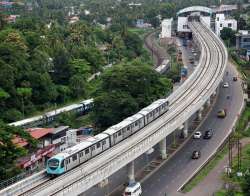Disabled friendly coaches, women at forefront: 10 facts to know about Kochi Metro
Kochi Metro was flagged off by Prime Minister Narendra Modi today.

Prime Minister Narendra Modi today inaugurated Kerala's prestigious Kochi Metro project which will open to public on Monday. Accompanied by Chief Minister Pinarayi Vijayan, Governor P Sathasivam, Union Urban Development Minister M Venkaiah Naidu and 'Metro man' E Sreedharan, the Prime Minister enjoyed the inaugural ride in the metro on Saturday.
Kochi Metro will start the Revenue operations on June 19, Monday from 6am onwards.
Here are some interesting facts to know about the Kochi Metro:
1- A 13 km stretch between Aluva and Palarivattom with 11 stations was inaugurated today.
2- The total route length of the metro is 26 km with 22 stations planned.
3- Kochi Metro is being built at an approximate cost of Rs 6,000 crore.
4- The first phase of Kochi Metro has ben completed in record time of three years and nine months.
5- Every metro station has been designed on a specific theme around Kerala culture and geography.
6- Kochi Metro is part of the larger 'Water Metro' project which aims to provide country's first integrated multi-model transport system.
7- The Metro has disabled friendly coaches with a special provision for wheelchairs, and reserved seats for people with disabilities.
8- The Kochi Metro Rail Ltd (KMRL) has given preference in giving jobs to women. From train operators to ground staff, the KRML has put women at the forefront. Members of Kudumbasree - the women empowerment-oriented, community-based, poverty reduction self-help group project of the Kerala government- will provide their services in managing the station operations.
9- Kudumbasree will provide a vast array of services from customer relations, crowd management, housekeeping and catering services, which once operational, will be the largest crew of women to be employed by any metro.
10- KMRL has also included the LGBT community in its operations along with Kudumbashree, thus becoming the first organization to appoint transgenders as per the state government's transgender policy.